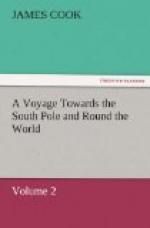fountain? Here was indeed a
wonder of the Deep!
I may call it the
Romance of his Voyage!
Those very shoals, fields, and floating mountains
of ice, among which he steered his perilous course,
and which presented such terrifying prospects of destruction;
those, I say, were the very means of his support,
by supplying him abundantly with what he most wanted.
It had been said that those stupendous masses of ice,
called
islands or
mountains, melted
into fresh water, though Crantz, the relator of that
paradox, did not imagine they originated from the sea,
but that they were first formed in the great rivers
of the North, and being carried down into the ocean,
were afterwards increased to that amazing height by
the snow that fell upon them*. But that all frozen
sea-water would thaw into fresh, had either never been
asserted, or had met with little credit. This
is certain that Captain Cook expected no such transmutation,
and therefore was agreeably surprised to find he had
one difficulty less to encounter, that of preserving
the health of his men so long on salt-provisions,
with a scanty allowance of corrupted water, or what
he could procure by distillation The melted ice of
the sea was not only fresh but soft, and so wholesome,
as to show the fallacy of human reason unsupported
by experiments. An ancient of great authority
had assigned, from theory, bad qualities to melted
snow; and from that period to the present times, this
prejudice extended to ice had not been quite removed.
[* Hist. of Greenland, b. I. ch, ii. para 11,
12.]
In this circumnavigation, amidst sleets and falls
of snow, fogs, and much moist weather, the Resolution
enjoyed nearly the same good state of health she had
done in the temperate and torrid zones. It appears
only from the journal of the Surgeon, that towards
the end of the first course* some of the crew began
to complain of the scurvy; but the disease made little
progress, except in one who had become early an invalid
from another cause. The other disorders were
likewise inconsiderable, such as common colds, slight
diarrhoeas, and intermittents that readily yielded
to the Bark: there were also some fevers of a
continued form, but which by timely care never rose
to an alarming height. Much commendation is therefore
due to the attention and abilities of Mr. PATTEN, the
Surgeon of the Resolution, for having so well
seconded his Captain in the discharge of his duty.
For it must be allowed, that in despite of the best
regulations and the best provisions, there will always
be among a numerous crew, during a long voyage, some
casualties more or less productive of sickness; and
that unless there be an intelligent medical assistant
on board, many under the wisest Commander will perish,
that otherwise might have been saved.
[* Viz. The voyage between the Cape of Good Hope
and New Zealand.]




